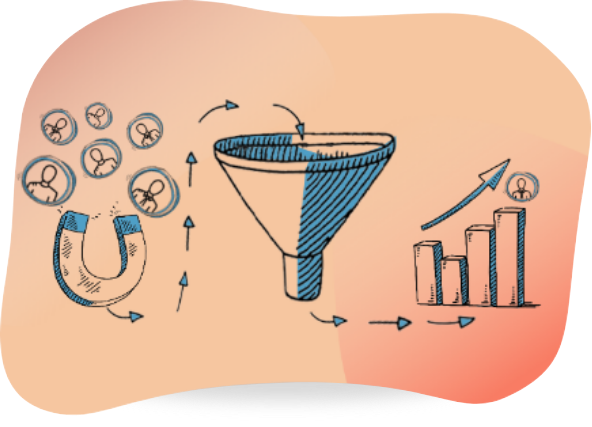Successful Sales Methodologies- Everything You Need To Know

Key Points
- A well-designed sales framework is necessary to navigate business challenges and drive growth.
- Value-selling is crucial, as it helps sales professionals understand and address customer needs and pain points.
- Prioritising different types of value, including financial, strategic, and operational, can maximise success in sales.
- Establishing clear sales processes with defined steps, expectations, and metrics is essential for driving revenue and achieving goals.
Introduction
Customers around the world have become increasingly concerned with the value that businesses provide, and as such, have come to expect more in terms of quality, affordability, and overall customer experience. Hubspot reports that 96% of successful sales calls focussed on value-based selling.
In today’s rapidly changing business environment, sales professionals face an array of challenges that can hinder their ability to close deals. Uncertainty brought on by ongoing supply chain issues, rising inflation, evolving regulatory environments, and political instability have made the sales environment more competitive and resource-constrained. As a result, sales professionals are finding it harder to help customers navigate the complex purchase decisions.
In this blog, we will explore the key elements of a successful sales methodology and provide practical guidance on how to implement it to drive growth and revenue for your organisation.
Importance of Value-Selling Methodology
A value-selling methodology is crucial in today’s rapidly evolving market, where traditional sales approaches are no longer effective.
Adopting a customer value orientation has become paramount for businesses that seek to remain competitive, with data revealing that up to 85% of respondents recognise the importance of this approach. By leveraging a value-selling methodology, businesses can better understand their customers’ unique needs and preferences and offer tailored solutions that deliver the greatest possible value.
A value-based selling approach aims to help customers comprehend the problems a product or service can solve and the value it can bring to their business. This process-oriented focus establishes customer trust, creates a reason for continued engagement with sales reps, and provides opportunities for new learning and understanding in each interaction.
Categories of Value in Sales
Focusing on financial incentives: Financial incentives demonstrate how a product or service can increase revenue or reduce costs for the customer.
Focusing on qualitative or process gains: Qualitative improvements to everyday pain points and improving process efficiencies are considered qualitative or process gains.
Focusing on differentiation: Companies achieve success by differentiating themselves, and when sales representatives can showcase how their product or service enhances the customer’s brand identity and competitive positioning, the value contribution becomes evident.
Focusing on enhancing security or mitigating risk: Identifying and addressing specific fears, risks, or vulnerabilities to mitigate market uncertainties is a powerful motivator that helps companies and provides customers with powerful reasoning for their purchase decisions.
To effectively provide value to customers, businesses must focus on delivering high-quality services and products with technical expertise and customised solutions and being proactive and receptive to customer feedback. This can help them develop more meaningful and long-lasting customer relationships, leading to increased loyalty and improved business outcomes.
Sales Process vs. Sales Methodology
Sales processes and sales methodologies are both crucial in the field of sales, but they serve different purposes.
A sales process refers to the specific set of actions that sales reps undertake to engage with customers at every step of the sales conversation and guide them towards making a purchase. It provides structure and consistency to the sales team’s efforts, ensuring they follow a clear progression and stay on track. Sales processes are unique to each organisation, shaped by factors such as industry, target personas, market position, and sales team structure.
Typically, sales processes include the following stages – Research, Prospect, Present, Persuade and Close.
On the other hand, a sales methodology is a broader philosophy or set of practices that guide the development of a sales process. It answers the question of why certain actions are taken, providing a rationale for the structure of the sales process. Sales methodologies are more generic and widely applicable than sales processes, and they are often developed by sales vendors or consultants. They represent specific approaches to driving sales effectiveness and developing sales skills.
Sales methodologies include the following stages:
- Strategies
- Tools
- Models
- Coaches and
- Scripts
While sales processes are unique to each organisation, sales methodologies are often publicly available and widely adopted by different types of sales organisations. The e-commerce giant Amazon uses both print and online media to advertise its shopping festivals as a methodology to lead prospects. However, data analytics and pricing decisions that affect user’s product recommendations are parts of the sales process that ensures a progression.
Some methodologies are tailored to specific sales cycle stages, such as discovery, qualification, or demos, while others may be applied to the full sales lifecycle. The choice of methodology depends on the specific needs and goals of the organisation.
Overall, a well-structured sales process backed by a formulated sales methodology is crucial for maximising sales efficacy and differentiating an organisation from its competitors. By providing structure, consistency, and a guiding philosophy, these two concepts work together to keep the sales team on track and the organisation’s operations cohesive
Sales Methodologies Through the Years
It’s not necessary to start from scratch when implementing a sales methodology for a business. Depending on their specific requirements, sales organisations can choose from a range of established and proven methodologies. The concept of formalised sales methodologies and training dates back to 1968 when Xerox introduced the Professional Selling Skills course, which centred on Selling by Needs Satisfaction. This approach involved four key phases: identifying needs, presenting solutions, handling objections, and closing the sale.
Some of the most common sales methodologies include SPIN selling, Conceptual Selling, Sandler Selling System, SNAP Selling, NEAT Selling, MEDDIC Sales Methodology, and Challenger Sales Methodology.
- SPIN Selling, created by Neil Rackham, suggests that sales representatives should use four types of questions when engaging with prospects. These include Situation questions that clarify the prospect’s current situation, Problem questions that identify their main pain points, Implication questions that help them visualise the consequences of not resolving the issue, and Need-payoff questions that prompt the prospect to envision the benefits of solving the problem. By utilising these questions, the representative aims to guide the prospect towards recognising the value of the product or solution independently.
- Conceptual Selling emphasises that customers do not buy a product; instead, they buy the concept of a solution that the product represents. The role of the sales rep is to understand the prospect’s decision-making process by asking five types of questions, including confirmation questions, new information questions, attitude questions, commitment questions, and basic issue questions.
- Sandler Selling System focuses on building mutual trust between the sales rep and the prospect. The system emphasises having the sales rep act as a consultant to discover objections and challenges early in the sales conversation to encourage transparency between the sales rep and the prospect.
- SNAP Selling is a streamlined methodology for fast-paced and stressed buyers. It centres around three critical decision points: access, shifting from the status quo, and changing resources. SNAP also offers four guidelines for sales reps – keep it Simple, be iNvaluable, always Align, and raise Priorities. By focusing on what’s most important to the prospect, salespeople can effectively connect with them and make it easy to buy.
- NEAT Selling is a qualification methodology designed to distinguish high-quality leads in the discovery process. The NEAT methodology stands for Need, Economic Impact, Access to Authority, and Timeline.
- MEDDIC Sales Methodology is designed for large, complex, enterprise-level deals. The system involves reps answering questions related to Metrics, Economic Buyer, Decision Criteria, Decision Process, identifying Pain, and Champion.
- Challenger Sales Methodology follow a three-step process of educating prospects about business problems, tailoring communications to specific needs, and taking control of the sale by challenging prospects where necessary. Rather than trying to be liked, they focus on closing the sale.
Creating a Sales Methodology Based on Market Segments
Sales organisations have a range of methodologies to choose from, with no simple formula for selecting the best one. Normally, a sales methodology is complemented with a preexisting sales process and a general directive that drives the organisation. Experts believe that there are three primary factors that should be considered when deciding on a sales methodology: the customer, the product, and the market.
The customer factor – When selecting a sales methodology, it’s crucial to balance annual contract value and customer acquisition cost. For small, high-velocity deals, streamlined sales cycles are critical. However, large deals require a focus on customer experience to avoid failing to meet expectations. The nature of buyers in different segments should also be considered. SMB customers are typically under-resourced and lack time for comprehensive evaluations, while enterprise sales involve large and growing buying committees. In this case, sellers must use methodologies that build consensus among stakeholders with varying pain points and objectives.
The product factor – This considers the ease with which customers can adopt and use a product or solution. Choosing a complex methodology for simple products needlessly increases customer acquisition costs and cuts into profits. On the other hand, more complex products requiring greater education for their effective use raise customer expectations for upfront and ongoing support through the sales process. In such cases, too simple a methodology would cost in terms of customer experience and lose deals.
The market factor – This considers the relationship between the market and the product. When customers are already aware of their needs and are looking for specific features or solutions, a methodology that challenges their worldview would not sit well. On the other hand, when selling an innovative solution that challenges the status quo, a consultative methodology might be required as prospects may have yet to identify the potential problems to be addressed by an innovative new product or service.
People and Processes in Sales Methodologies
The alignment of people and processes is essential for consistent adoption of methodologies. Companies need to make short-term and long-term changes to bridge the gap between their current status quo and the requirements of the new methodology. They must consider the following:
- Alignment across the customer organisation: Successful implementation of a new sales methodology requires alignment across the customer organisation, including marketing, customer success, training, enablement, and frontline sales managers. A customer value framework cannot be implemented by frontline sales reps alone but requires a 360-degree process and infrastructure for success.
- Frontline sales leadership buy-in: Frontline managers will be responsible for overseeing the adoption of the methodology and coaching sales reps accordingly. Their support and willingness to coach within the new paradigm are crucial for successful implementation.
- Structured change communication: Effective communication is critical for ensuring all teams are on board with a change in methodologies. It is important to communicate the need and value of the change early on and in a structured manner so that the message permeates through every level of the customer organisation.
- Structured training and reinforcement: To successfully implement a new sales methodology, both sales reps and managers need training. Spaced reinforcement is the most effective training method to ensure successful integration of the new methodology.
- Rep and manager enablement: Regardless of the chosen methodology, access to relevant data and tools is crucial for its effective integration into the workflow of sales representatives and managers. Therefore, enablement is a vital aspect of adopting a new methodology.
- Clear metrics and measurement: Organisations need to measure their progress to achieve meaningful change. Measuring the impact of a new methodology requires establishing clear metrics and tracking progress from goals to activities to tangible business results.
Challenges That Companies May Face When Adopting A Sales Methodology
When adopting a sales methodology, it is important to carefully consider the needs, capabilities, and culture of a sales organisation. Failing to do so can result in significant challenges. To avoid common pitfalls, sales organisations should be aware of the following:
- Aligning Organisational Goals With Newest Sales Methodologies: It is important to avoid choosing a sales methodology simply because it is new or trending. While many branded sales methodologies have data and testimonials supporting their effectiveness, it is essential to review this information in light of the goals, targets, and needs of the sales organisation. To ensure a methodology is effective, it must be used consistently, and this requires a clear understanding of why a particular methodology is being adopted.
- Sales Reps Vs Technology: Sales organisations must not prioritise technology over rep competency. While new sales tools can be appealing, they often increase the quantity of sales activities without improving their quality. Adopting and applying a sales methodology effectively requires sales organisations to develop soft skills in their reps, such as active listening, empathy, rapport-building, and communication skills, in response to changing business needs. Research shows that the development of soft skills is crucial for high revenue growth.
- Rigid Methodology: A sales methodology is a strategic framework and not a rigid formula to be applied uniformly. A one-size-fits-all approach is ineffective as each sales conversation requires situational adaptation. It’s crucial to adapt to changing market conditions and customer expectations to avoid losing customers. Therefore, sales reps must be trained to adapt to changes and be flexible in their approach.
- Time Is Key: Adopting a new methodology requires a long-term commitment. Sales organisations must invest sufficient time and resources to reinforce methodology adoption frequently, plan for continued rep learning and practice, and avoid a once-and-done approach.
- Preparing For Change: Sales organisations must plan for change management. Change can be unsettling for members of the organisation, and it will be resisted unless a compelling rationale for the change is provided. Therefore, change management is a crucial component of adopting a new sales methodology, and it must be done in keeping with the communication needs of the different members of the sales organisation.
Lastly, companies should mix and match methodologies where necessary to customise a methodology to their specific business needs. Adopting a sales methodology requires careful consideration, planning, and execution. Avoiding common pitfalls can help ensure the success of the sales organisation and improve revenue growth.
Outsourcing For Sales Success
Outsourcing can be a valuable tool for organisations seeking to expand their sales capacity. One of the main benefits of outsourcing is the availability of ready expertise, which can provide top-tier talent with prior exposure and training in various methodologies. This can save time in training existing reps in new processes and approaches.
Outsourced partners also offer affordable costs, allowing organisations to augment their sales capabilities without putting a significant dent in the bottom line.
Furthermore, outsourced partners can take on time-consuming aspects of the sales process, allowing in-house resources to be refocused toward planned transformation. Outsourcing sales solutions also provides convenient ways to scale up operations, expand the market, increase customer satisfaction, and deliver omnichannel customer engagement. In addition, outsourcing saves money by building an inside sales team and provides insight into new markets.
By outsourcing, organisations can have their sales reps focused on closing warm leads delivered to them on a plate, which helps avoid the management overheads associated with an in-house sales team.
Conclusion
Jeff Bezos’ relentless strategy for Amazon focuses on customer satisfaction, investing in innovation, and expanding the company’s reach into new markets. A successful sales framework is essential for businesses of all sizes to drive growth and revenue in today’s challenging business environment.
Value-selling, which focuses on understanding and addressing customers’ unique needs and pain points, is crucial to any effective sales methodology. It’s also important to categorise and prioritise the different types of value that customers may seek, such as financial, strategic, and operational value. Additionally, businesses should establish clear sales processes and continuously monitor and optimise them to improve performance and drive results.
Despite the varied approaches to sales methodologies, a well-designed framework can help sales professionals navigate the complex and ever-changing landscape of B2B sales, and ultimately drive success for their organisation.



![[Sales & Marketing Success] The Need for Data Accuracy](https://www.regalix.com/wp-content/uploads/2023/02/Sales-Marketing-Success-The-Need-for-Data-Accuracy_TN.png)

